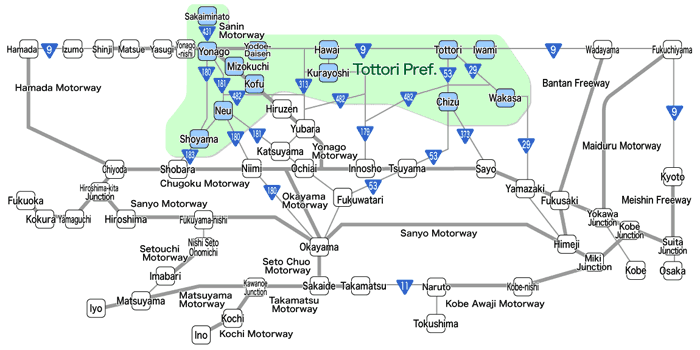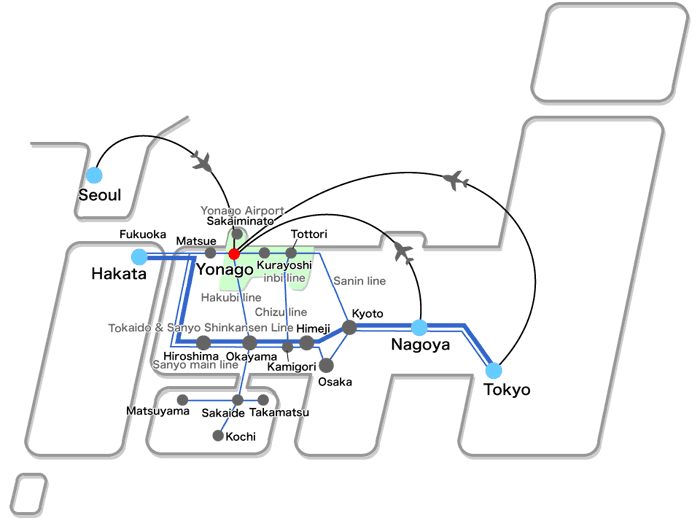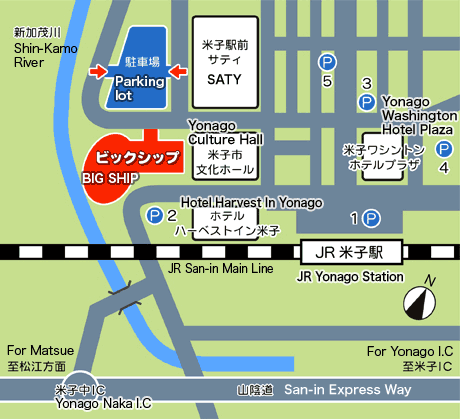【JAPANESE】 |
 |
You are here: Welcome >> Visit Yonago, Tottori
Venue
Access to Conference Venue |
|
 |
|
 |
|
・5 minutes walk for JR Yonago station ・25 minutes by car from Yonago Airport ・Yonago Motorway is 5 minutes by car from Yonago Naka I.C (via Sanin motorway, Matsue direction) |
 |
Train |
|
Yonago - Tokyo |
Express : 5hrs 20min (Hakubi line & Shinkansen Line) |
Yonago - Shin-Osaka |
Express : 2hrs 45min (Hakubi line & Shinkansen Line) |
Yonago - Hakata |
Express : 3hrs 50min (Hakubi line & Shinkansen Line) |
Yonago - Okayama |
Express : 2hrs (Hakubi line) |
Airplane |
|
Yonago Airport - Tokyo |
75min (ANA, 5 round trip flights daily) |
Yonago Airport - Nagoya |
65min (ANA, 2 round trip flights daily) |
Yonago Airport - Seoul |
90min (Asiana Airlines, 3 round trip flights weekly) |
Highway Bus |
|
Yonago - Tokyo |
10hrs 45min (overnight, 1 round trip daily) |
Yonago - Osaka |
3hrs 30min (18 round trip daily) |
Yonago - Kobe |
3hrs 20min (5 round trip daily) |
Yonago - Kyoto |
4hrs 15min (3 round trip daily) |
Yonago - Hiroshima |
3hrs 55min (5 round trip daily) |
Yonago - Fukuyama |
3hrs 30min (1 round trip daily) |
Yonago - Okayama |
2hrs 15min (7 round trip daily) |
Yonago - Fukuoka |
8hrs 50min (overnight, 1 round trip daily) |
Visit Yonago, Tottori
Yonago city where the west side of Tottori prefecture and the San-in region are located in the center mostly.
The most part in the city is the flat topography, and mountain skirts of Koureizan of 751.4 meters of east altitude and Daisen where I participate in that are the degree dotted with the pile of about 100 meters of altitude again in the south. Hotsushoji watercourse in addition to Hino-gawa which originates in Daisen and Chugoku-sanchi, Sata river and Utagawa flow to the stretch, and it flows into the Sea of Japan. The water which sprang from the Oyama foot of a mountain is admitted widely as brand-name spring water.
Passport and Visa All foreign nationals wishing to enter Japan is required to present a valid passport at the port of entry.
Duty Free Import
Insurance
Climate
Electricity
Shopping
Money DenominationsThe unit of Japanese currency is Yen (\). Coins are available in denominations of 1, 5, 10, 50, 100 and 500 Yen. Bank notes are available in denominations of 1,000, 2,000, 5,000 and 10,000 Yen.
Currency Exchange
Traveler's Checks and Credit CardsTraveler's checks are not as popular as in some other countries; they are accepted only by leading banks and major hotels in large cities. International credit cards ( VISA, MasterCard, Diners Club, and American Express ) are widely accepted at hotels, department stores, shops, restaurants and nightclubs. However, credit card transactions are not always convenient outside large cities, so obtaining cash beforehand is recommended when you travel to the countryside.
Automatic Teller Machines (ATMs)ATMs are commonly available in large urban areas throughout Japan. However, most of them do not accept international credit cards or cash cards. Their service hours are often restricted during the day time on weekdays (Mostly from 9:00AM to 5:00PM or later, Monday through Friday, and Saturday morning).
For ATMs that accept credit cards, it is advised to contact their customer support desk beforehand to check the location of ATMs and their availability as these conditions vary from machine to machine. In general, international credit, debit and cash cards can be used at over 21,000 Post Office ATMs in locations throughout Japan. Post offices where this service is available display stickers indicating which cards are accepted. Cards from the Cirrus, Plus, Maestro and Visa Electron networks can be used. The closest post office to the venue is located in Telecom Center at the next Yurikamome Station (Open during 9:00AM to 5:30PM Monday to Friday, to 12:30PM on Saturday).
Citibank, N.A. offers international cashing service, 24 hours 7 days a week, though the locations of their ATMs are limited to international airports and large terminals. Their closest ATM to the venue is located in Tokyo Big Sight, at the third station on the Yurikamome tram; Kokusai Tenjijo Seimon (Open during 9:00AM to 7:00PM).
CustomsThere is no limit on the amount of any currency that may be brought into or taken out of Japan. However, if you transport (any currencies, checks, or securities) exceeding 1,000,000 Yen worth in Japanese currency in or out of the country, you must declare at the customs.
TippingTipping is not necessary anywhere, even at hotels and restaurants. |